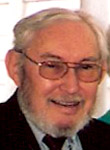James Gillett, pioneer of ecotoxicology, dies at age 77
By Stacey Shackford

James W. Gillett, professor emeritus in the Department of Natural Resources, died June 20 in Ithaca from various health complications. He was 77.
Gillett, who joined the Cornell faculty in 1983 and became emeritus in 2006, was the first professor of ecotoxicology in the United States. He was among the first to teach courses in ecological risk assessment and to develop mathematical models evaluating exposure of multiple species to such pesticides as DDT and such industrial products as PCBs.
He served as director of Cornell's Institute for Comparative and Environmental Toxicology from 1986 to 1992, established a risk analysis studies program within the graduate field of environmental toxicology and created a new minor field for risk analysis, communications and policy.
Gillett also oversaw the Superfund Basic Research and Education Program from 1992 to 2001. In that role, he focused on identifying and reducing hazards and chronic exposure from low-level hazardous substances from Superfund sites, on both human health and the environment.
He was affiliated with the American Indian Program, and one of his projects was to develop a more holistic approach to address the adverse effects of dietary pollutants on Native populations. In particular, he worked with the Akwesasne Mohawk Indian Reservation, which is on the Canadian border downstream from a set of heavily contaminated Superfund sites.
Born in Kansas, Gillett received his B.S. in chemistry from the University of Kansas (1955) and Ph.D. in biochemistry from the University of California-Berkeley (1962). After serving as an assistant and associate professor at Oregon State University in agricultural chemistry (1964-73), he worked as a senior terrestrial ecologist and environmental scientist at the U.S. Environmental Protection Agency's National Ecology Research Laboratory in Corvallis, Ore. (1974-83), where he made significant contributions to the methods for evaluating the safety of pesticides and toxic substances.
He produced more than 80 peer-reviewed publications, two books and numerous reports. He chaired several national committees on environmental issues and served a term on the President's Scientific Advisory Board for Biotechnology. He also consulted for local communities faced with monumental cleanup issues.
A survivor of esophageal cancer, Gillett founded the Esophageal Cancer Awareness Association and worked with the National Institutes of Health and the Food and Drug Administration in their patient representative and advocate programs.
Gillett also served as chair of the College of Agriculture and Life Sciences Faculty Senate for several years and remained active at the college after his retirement.
"Jim had an amazing wealth of knowledge on the toxicology of chemicals and great compassion for those affected by chemical exposures," said Suzanne Snedeker, graduate field member in environmental toxicology and visiting fellow at Cornell. "His level of energy was amazing, whether it was developing or reviewing scientific reports, expressing his views at Faculty Senate meetings, mentoring students, supporting other cancer survivors, or even giving campus directions to parents on moving in day for Cornell freshmen. He exemplified a life devoted to Cornell."
A campus memorial service is being planning for the fall.
Stacey Shackford is a staff writer in the College of Agriculture and Life Sciences.
Media Contact
Get Cornell news delivered right to your inbox.
Subscribe